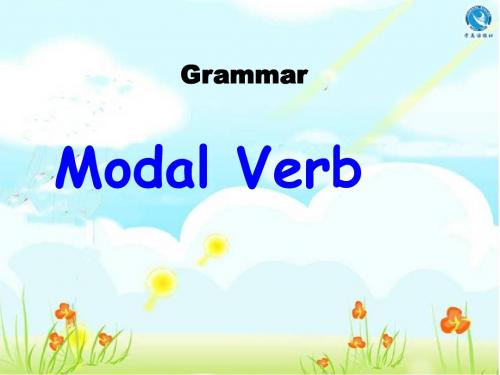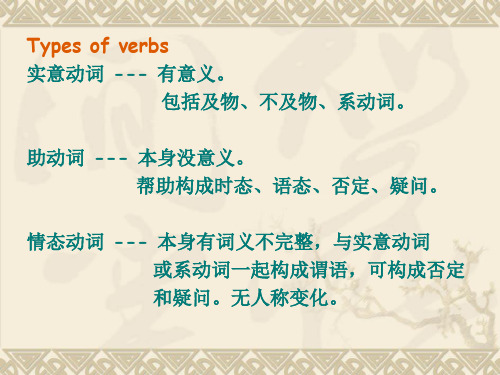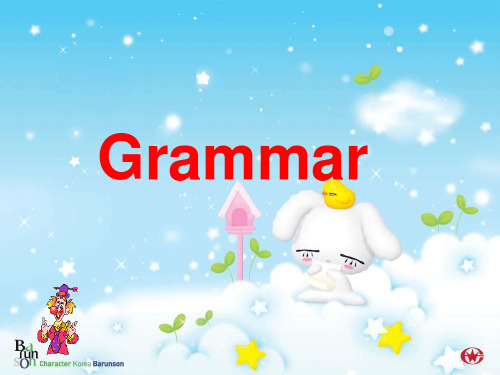modal verbs 1
modal verbs

3)表示“可以”或“被允许”。如: )表示“可以” 被允许” You can not leave your work undone. Can I use your bike? 表示建议或请求, 用could表示建议或请求,语气更委婉。主要用 表示建议或请求 语气更委婉。 于疑问句,一般不用于肯定句, can。 于疑问句,一般不用于肯定句,答语应用 can。 如:Could I come to see you tomorrow? Yes, you can.(No, I’m afraid not.) Might I sit here? Yes, you may.
ቤተ መጻሕፍቲ ባይዱ
2)表推测 用于肯定句) 表推测( 用于肯定句) 表推测 must +动词原形 动词原形 (对于现在情况的推测) 对于现在情况的推测) must+be +现在分词 现在分词 (表示“一定”正在做……) 表示“一定”正在做 ) must+ have +过去分词 过去分词 (表示对过去情况的推测。) 表示对过去情况的推测。)
be able to 可用于更多的时态,另外,can 和be 可用于更多的时态,另外, able to 不能连用。 不能连用。 5)表推测(用于疑问句和否定句) )表推测(用于疑问句和否定句) Can/ could(not) +动词原形 动词原形 (对于现在情况的推测) 对于现在情况的推测) Can/ could(not) +be +现在分词 现在分词 (表示“想必”、“可能”,“一定”正在 表示“想必” 可能” 一定” 做……) ) Can/ could(not)+ have +过去分词 过去分词 (表示对过去情况的推测。) 表示对过去情况的推测。)
modal verbs

张琬婧
Who can read it fastest and more clearly?
Tongue twister
(绕口令)
aux.能;可能 vt.将…装入罐中 保存 n.(食品)罐头
Can you can a can as a canner(罐头制造商)can can a can ?
May you have a nice day.
May you succeed. 祝你成功!
和外国人拼英语
一人在公交车上不小心踩了外国人的脚,心想 咱不能给中国人丢脸,于是卯足了劲说了句英文: “I’ m sorry” 外国人一想:在人家国土上咱不能不礼貌。于 是忙点头:“I’ m sorry too” 此人一听急了:Two?以为我不会数数?咬牙道: “I’ m sorry three” 外国人大惑不 解“What are you sorry for?” 此人心想好啊,连FOUR也出来了,我和你拼 了:“I’m sorry five!!!!”
你能够像罐头制造商一样装罐头吗?
Five Golden Rules
一般疑问句 (升调)语调)
Sense group (意群)
Liaison (连读)
辅音结尾,元音开头
Stress (重读) Pronunciatio n (发音)
介词、连词、冠词、 代词等虚词要弱读
Can _______ I help you?
can/could:
2.在疑问句中,用could可表示请求,语 气较委婉。
Could I speak to Mr. Smith, please?
Could — ____ I smoke here ? can — Yes, you _____. can’t / No, you _____.
modal verb(情态动词)

Modal Verb
什么是情态动词? (Modal Verbs) 情态动词表示说话人的某种 感情或语气,对某一动作 或状态的某种态度。 表示“需要、可以、 必须、应当”等。
情态动词的语法特征
1. 情态动词不能单独做谓语,除ought 和have外,后面只能接不带to的不定式。 2. 情态动词没有人称,数的变化,但有 些情态动词,如can, will也有一般式 和过去式的变化。
may 常用来表示: A. 表示请求、允许: B. 表示说话人的猜测: “也许” “可 能”: 通常只用于肯定句和否定句中。
C. 表示祝愿; 但语气较正式: might 的用法有: 多在间接引语中表示过去的可能和允 许。如: She said that he might take her bike. 她说他可以拿她的自行车去用。
表示现在的许可,语气比may 较委婉,
一般用于疑问句(包括间接疑问句),
不可用于肯定句或者否定句。
如: Might I have a word with you?
我可以和你说句话吗?
will和would
1. will是助动词还是情态动词?
will用于构成将来时是助动词。
用于表示“意志”“决心”“请求”是
2. 表示否定的情态动词的用法:
部分情态动词的否定式是情态动词中的 考点之一。 mustn’t 不准; 禁止 needn’t 没必要 ( = don’t have to ) can’t 不能; 不可能 may not 不可以; 可能不 shouldn’t 不应该 ( = ought not to )
表示主语的义务或责任: You should take care of your sister. 你应当去照顾你妹妹。 或指出一个正确、明智的动作: They shouldn't allow parking here; the street is too narrow. 这儿不该允许停车;马路太窄了。
Modal verbs

3) ought to / used to / have to (否定形式) oughtn’t to do… usedn’t (usen’t) to do… / didn’t use to do… don’t / didn’t / won’t have to do…
3. must 必须、必要 / have to 不得不 1)Must I finish the work today? --- Yes, you must. --- No, you needn’t. No, you don’t have to. 2) must do/ must have done 表肯定的猜测 3) You mustn’t talk loudly in the readingroom, must you?
c.f. didn’t need to do (没必要,也不一定做)
4. 表过去虚拟语气条件句中 If he had listened to you, he would / should / might / could have passed the test. 本来会/本应该/本可以/本能够
III. Special 1) may / might as well do … had better (not) do… c.f. It is better to do than (to) do … would rather (not) do … would rather do … than do … 2) can’t (help / choose) but do … c.f. can’t help doing … can’t help (to) do … can’t … too … You can’t be too careful.
modal verbs 情态动词

You must not cycle.
You must not enter.
You must be careful.
You must turn left.
You must pay ten yuan.
You must keep silent.
You must not smoke. You must not turn right.
★
情态动词
情态动词不能单独作谓语动词,后接其它 动词原形做谓语,没有人称和数的变化。
1. 表示能够或不能做某事用can 或 can’t;
A bird can fly . Fish can’t live without water.
2. 告诉人们必须或禁止做某事用must
或mustn’t;
You must hand in your homework at once. You mustn’t talk loudly in public.
肯定句 1. 现在时 2. 过去时 1. I can speak Chinese. 否定句 1. 现在时 2. 过去时 1. I can’t speak Chinese.
2. I could speak Chinese when I was a kid.
2. I couldn’t speak Chinese when I was a kid.
subtract ____ Can Kitty _________? Yes, she can. _____________
may (perhaps) 也许,可能
• “may” 常被用来表达可能性,也可以表示 请求。
表示请求: May I use your bathroom? 表示可能性 :I may go shopping in the afternoon. may的过去时 might He might be our new teacher. PS:might也可以表示推测,可能性比may小,语 气更婉转。
Modal Verbs1

Modal Verbs (情态动词)一、情态动词:can, could, may, might, mist, need, ought to, dare, 有时shall, should, will,would 在一定场合下也算作情态动词。
二、情态动词的用法:1.情态动词后接动词原形表示现在的情况e.g. We must work hard at our lessons.We ought to help each other in our study.2.情态动词后接动词的完成形式构成谓语表示过去的情况,意为:“应当已经…,“想必已经…等1). can / could /may / might /must + have done表示对过去事件的推论,意为;“可能”“也许”“一定”已经做了某事。
e.g. The ground is wet. It must have rainedlast night .2). should / ought to + have done 表示本应该做而没有做。
e.g. I should have bought that fashion shoesyesterday, but I didn’t .Your grandfather died. He ought to haveenjoyed his leisure time.3). should not / ought not to + have done 表示本不该做而做了。
e.g. The man is very clever. He ought not tohave done such a stupid thing.4). needn’ t + have done表示做了不必做的事,意为:“本不必”e.g. You needn’t have bought that coat, we canmake one for you.You needn’t have seen me, I will go backthis afternoon.Exercises (情态动词)1. You are late for work again. You ____have been here an hour earlier.A. shouldB. mayC. mustD. could2. That’ s all right. I can deal with it. You ____ with me.A. don’t need goB. need not go toC. need not goD. need go3. To travel from American to England you must have a passport, but to travel from England to Scotland you ____ .A. mustn’tB. can’tC. don’t haveD. needn’t have4. The house is dark. The Greens ____ to bed.A. must have goneB. should goC. should have goneD. must go5. His English composition is not too good, she ___ itherself.A. can’t have writtenB. won’t have writtenC. mustn’t have writtenD. should have written6. My purse was not found . I ____when I was in a train.A. must dropB. had droppedC. should have droppedD. must have dropped7. They didn’t seem surprised when I told them the news. They ___ about it.A. may have knownB. will have knownC. need have knownD. should have known8. The room is in a terrible mess, it ___ cleaned.A. can’t have beenB. shouldn’t have beenC. mustn’t have beenD. wouldn’t have been9. You ____ the job yesterday. We have a secretaryTo do that kind of thing.A. needn’t have doneB. mustn’t have doneC. should have doneD. can’t have done10. You ___her yesterday. She has been out for two days.A. needn’t have seenB. must have seenC. might have seenD. can’t have seen11. He thought it ___ last night.A. couldn’t rainB. couldn’t have rainedC. mustn’t have rainedD. needn’t have rained12. He ___ at the meeting, but I didn’t notice him there.A. must have beenB. would have beenC. may have beenD. must be13. He hasn’t come yet, he ___ an accident.A. must have beenB. would have beenC. may have beenD. must be14. He ___ be Canadian because he has got a Japanesepassport.A. can’tB. isn’t ableC. mustn’tD. doesn’t15. I was really anxious about you . You __ homewithout a word .A. mustn’t leaveB. shouldn’t have leftC. couldn’t have leftD. needn’t leave16. I am not feeling well in the stomach. I ___ so muchfried chicken just now.A. shouldn’t eatB. mustn’t have eatenC. shouldn’t have eatenD. mustn’t eat17. My English-Chinese dictionary has disappeared.Who ___ have taken it?A. shouldB. mustC. couldD. would18. Mr. White ___at 8:30 for the meeting, but he didn’tShow up.A. should have arrivedB. should arriveC. should have had arrivedD. should be arriving19. __ Tom graduated from college at a very young age.__Oh, he ___have been a very smart boy then.A. couldB. shouldC. mightD. must20. __I will tell Mary about her new job tomorrow.__ You ____her last week.A. ought to tellB. would have toldC. must tellD. should have told。
情态动词讲解课件

1.Can this be an excuse for not giving them help? 表示惊异、怀疑、不相信 2.This can’t be true. 等态度,主要用在否定句、 3.How can you be so crazy. 疑问句和感叹句中。
特别说明:
1.could用来表示请求时,语气委婉,主要用于疑问句,不能用于肯定句,答语应用can(即:could不能 用于现在时态的简略答语中)。如: ——Could I use your dictionary? ——Yes, you can.(否定回答可用:No, I’m afraid not.或者是you can’t)
1.May you succeed. 2.May you live happily! 3.May she rest in peace.愿她安息。
1.There is nothing to do, so I may as well go to bed. 2.You may as well tell us now, we’ll find out sooner or later. 3.I suppose we might as well go home.
在表示请求、允许时,might比may语气 更委婉些。用May I征询对方许可在文体 上比较正式,在日常用语中,用Can I征 询对方意见更为常见。
1.Might I borrow your pen 2.I wonder if I might speak to your son.
表示可能性的推测,通常用在肯定句和否 定句中,含有“或许”“大概”“可能” 之意;用might代替may时,则语气显得更 加不肯定。 may用于祈使句表示祝愿
1) 情态动词不能表示正在发生或已经发生的事情,只表示期待或估计某事的 发生。
modalverbs(1)

Modal Verbs
possibility: can / could, may / might certainty: must, will, should
ability: can / could, be able to
permission: can / could, may / might
只是可能性比may 小。
2) 成语:may/might as well,后面接不带 to 的不定式,意为"不妨"。 e.g. If that is the case, we may as well try.
3. have to和must 1) 两词都是“必须”的意思, have to 表示客观的需要, must 表示说话人 主观上的看法, 即主观上的必要。 e.g. My brother was very ill, so I had to call the doctor in the middle of the night. He said that they must work hard.
phone call?
---Well, I must have been sleeping, so I didn’t hear it. 5) 否定推测用can’t. e.g. If Tom didn’t leave here until five o’clock, he can’t be home yet.
1. 情态动词没有人称和数的变化,即情
态动词第三人称单数不加- s (have
to, have got to, be able to 除外)。 2. 情态动词不能表示正在发生或已经 发生的事情,只表示期待或估计某事 的发生。
3. 情态动词本身具有一定词义,但不
- 1、下载文档前请自行甄别文档内容的完整性,平台不提供额外的编辑、内容补充、找答案等附加服务。
- 2、"仅部分预览"的文档,不可在线预览部分如存在完整性等问题,可反馈申请退款(可完整预览的文档不适用该条件!)。
- 3、如文档侵犯您的权益,请联系客服反馈,我们会尽快为您处理(人工客服工作时间:9:00-18:30)。
SHOULDN´T HAVE
It´s used to express or show regret or express some criticism
I shouldn´t have drunk that much
HAD BETTER
FORM HAD BETTER+ BARE INFINITIVE HAD BETTER NOT+BARE INFINITIVE
MODALS OF POSSIBILITY AND CERTAINTY
100% SURE. must
50% POSSIBLE may/might
0% SURE / IMPOSSIBLE can´t
MODALS OF POSSIBILITY AND CERTAINTY
MUST
EX: lucy must be at home. The lights are on
SEMI-MODAL VERBS
BE ABLE TO: Suppletive form To express ability in all those tenses can, could can´t express
Ex: she hasn´t been able to find a job yet
Ex: She can´t have understood the question
SHOULD HAVE+ PAST PARTICIPLE
To express your opinions about something in the past. Now it´s too late
Ex: He should have agreed to come to the party. It was real fun
She had to get up early last Saturday since she had to attend a very important lecture
PROHIBITION AND NECESSITY
MUSTN´T
Ex: You mustn´t lie on your CV
MODALS + PERFECT INFINITIVES
Must have…. Logical inference about the past
Ex: you must have seen John at the party
MODALS + PERFECT INFINITIVES
Can´t ..
CHAPTER 3
Modal Verbs
Advance English Grammar
Hector Martinez Garcia
CHAPTER 3
Modal Verbs Practice Link
The followig web site is excellent to practice and revise modal verbs
OUTLINE
GENERAL FEATURES MODAL VERBS
Classified according to the meaning they express We will include semi-modals or suppletive forms A modal verb can appear in more than one meaning
MIGHT/MAY/COULD HAVE +PAST PARTICIPLE Something which was possible in the past but it didn´t finally happen
EX: She could have taken the job but she didn´t
May/might/could
EX: Peter has come to class today. He might be ill
Can´t
EX: Lucy can´t be at home. The lights are off
MODALS OF OBLIGATION
MUST ( Inner obligation)
(NOT HAVE TO)Remember to use auxiliary verbs
Ex: you don´t have to pick me up if
you don´t want to (it´s not compulsory) NEED
You need to take some time off
GENERAL FEATURES
MOST OF THEM ARE FOLLOWED BY BARE INFINITIVE Ex: She should be here by five o´clock They do not have inflections (-ed, -ing, 3rd person singular –s) Ex: He can speak five different languages They are negated by adding not Ex: She might not come since she is very angry with me We do not find those features in Be able to Have to Be allowed to
can
might
would must
will ought should to
Modals are different from normal verbs:
1: They don't use an 's' for the third person singular. 2: They make questions by inversion ('she can go' becomes 'can she go?'). 3: They are followed directly by the infinitive of another verb (without 'to').
I´d rather cook the dinner now. I´m in a hurry
I´d rather you didn´t cook. You are a terrible chef
RATHER
Used together with prefer
I prefer coke to water I prefer drinking coke to drinking water I prefer to drink coke rather than drink water I´d prefer to drink a coke rather than drink water
Was/were able(managed just once) to vs could (general ability in the past)
Ex: At the age of six, I could play the piano Ex: At the age of six, I couldn´t play the piano. But once, I was able to play the happy birthday song once.
could abuse you without any reason at all
a gerund, to-infinitive, a perfect tense
Be able to:
More formal. In the past to be allowed to , to be
NEEDN´T isn´t followed by to
Ex: you needn´t study for this exam
Advice
SHOULD/OUGHT TO They are used to express advice
Ex: You ought not to apply for that job
/modals/modalintro.html
Hector Martinez Garcia
Here's a list of the modal verbs in English:
CHAPTER 3
could may
shall
Here is a list of the modal verbs in English
Permission
CAN/MAY/COULD It depends on the degree of politeness
Can / May I come in? Could I come in Mr Robinson?
MODALS + PERFECT INFINITIVES (to have / ppart)
Ex: I´d rather not go out this evening if you don´t mind Ex: I´d rather stay at home than go out
WOULD RATHER
I´d rather you did something Notice the difference:
SUMMARISING (part 2)
CAN / COULD / MAY
Physical ability: I can speak English Senses: I can’t think of a solution Permission: May I go to the toilet? Asking: Could you give me...? Negative deduction: He can’t be there Probability: She could be here in a minute. Possibility: This new model can be red or white Conditional: He could go tomorrow Habitual Past: At that time he was very nervous; he
